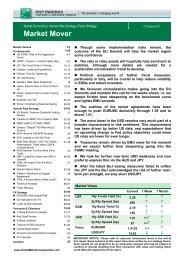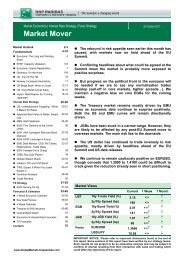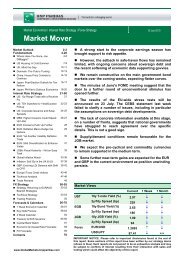Market Economics | Interest Rate Strategy - BNP PARIBAS ...
Market Economics | Interest Rate Strategy - BNP PARIBAS ...
Market Economics | Interest Rate Strategy - BNP PARIBAS ...
Create successful ePaper yourself
Turn your PDF publications into a flip-book with our unique Google optimized e-Paper software.
markets to slide, reminding us of the adage: ‘Sell in<br />
May and go away’. This means following a risk-off<br />
strategy for currency markets, favouring the USD,<br />
CHF and JPY in that order.<br />
EURUSD and equities: The correlation will return<br />
Should equity and other risky asset markets decline,<br />
the EUR will be a victim. This finding might surprise<br />
given that the correlation between EURUSD and the<br />
performance of share markets has collapsed over<br />
recent months. However, the correlation has<br />
collapsed due to inflows into the EMU bond market<br />
weakening at a faster pace than the inflows into<br />
European share markets. Financial account data<br />
show that the 12-month sum of inflows into European<br />
bond markets has collapsed from EUR 285bn to<br />
EUR 20bn within the course of a year. But during the<br />
same period, foreign investors kept on buying shares<br />
and short-dated money market instruments, keeping<br />
total portfolio inflows at a reasonably strong EUR<br />
320bn. The combination of weak bond and strong<br />
equity inflows led the EURUSD-capital market<br />
correlation to decline. However, should the equity<br />
markets lose their upward momentum or even turn<br />
south, EURUSD will trade sharply lower.<br />
The Aussie case<br />
Should global liquidity decline, putting risky assets<br />
out of favour, we see commodity currencies coming<br />
under selling pressure too. Of course, changes to<br />
Asian liquidity most notably via China increasing<br />
domestic interest rates will impact commodity<br />
currencies more compared to liquidity declines due to<br />
(i) difficulties within the European banking system<br />
developing on the back of the Greek or more broadly<br />
speaking European peripheral crisis or (ii) the US<br />
introducing tough financial sector reforms. However,<br />
once equity markets turn down, investors will not ask<br />
what caused the decline. People will just take profits<br />
on commodity- and high-yielding currencies. The<br />
exposure within this FX market segment is<br />
significant, suggesting the first wave of a sell-off<br />
would be sharp.<br />
Sterling undervalued? Dream on<br />
Last not least, we turn again to sterling. A<br />
Conservative-led government would no doubt be less<br />
damaging to capital markets than another Labour<br />
government, but the Institute for Fiscal Studies<br />
suggested that all main three party elections<br />
manifestos were showing significant budget gaps.<br />
These range from GBP 38bn in the case of the<br />
Liberal Democrats to more than GBP 52bn for the<br />
Conservatives. We cannot repeat often enough that<br />
the over-leveraged British economy will find it difficult<br />
to grow out of its problems (leverage is always<br />
deflationary in a country unless debt is monetised)<br />
suggesting the government will either have a higher<br />
tax take or lower revenues. The Sunday Times<br />
newspaper reported that BoE chief Mervyn King<br />
Chart 7: EUR: Net Financial including Bond<br />
flows have collapsed<br />
Source: Reuters EcoWin Pro, <strong>BNP</strong> Paribas<br />
Chart 8: There is no yield in core Euroland<br />
Source: Reuters EcoWin Pro, <strong>BNP</strong> Paribas<br />
privately admitted that sterling rates will have to stay<br />
low for several years, implying that the sterling<br />
forward curve is wrongly priced. Whichever way we<br />
look at it, sterling remains a clear sell. Either it will<br />
trade lower as investors lose trust in the country’s<br />
ability to reduce its debt and deficit levels or it will<br />
decline due to the impact of budget consolidation on<br />
growth. One could argue that budget consolidation<br />
gives greater scope for the private sector to invest as<br />
rates and yields should fall due to lower public<br />
borrowing, creating a ‘crowding-in’ effect.<br />
Unfortunately, it will not work this way in the UK.<br />
Money market rates are already low and the<br />
crowding-in effect will not develop: there was no<br />
crowding-out effect when UK deficits were rising as<br />
the BoE counterbalanced any possible effect through<br />
its quantitative easing policy. The BoE has stopped<br />
buying gilts, at least for now, suggesting that the<br />
deficit may have to be completely funded via the<br />
capital market. This means that 2010 and 2011 will<br />
see more net capital demand from the public sector<br />
than 2009 – even if the deficit reduction process<br />
turns out to be successful. Hence, crowding in is not<br />
going to happen. Sterling is the only variable the UK<br />
can manipulate to create the positive growth impulse<br />
that will sorely be needed to compensate for the loss<br />
of public demand.<br />
Hans Redeker 7 May 2010<br />
<strong>Market</strong> Mover, Non-Objective Research Section<br />
64<br />
www.Global<strong>Market</strong>s.bnpparibas.com
















